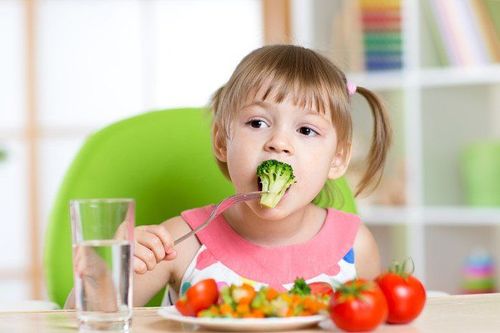This article is written with expert consultation from Dr. Huynh Bao Toan, MSc., MD., Pediatric and Neonatal Specialist – Pediatrics and Neonatal Department – Vinmec Nha Trang International General Hospital.
Most parents struggle to persuade their children to eat vegetables. It is common for children to refuse vegetables, especially during the early stages of introducing solids. If children do not consume vegetables over a prolonged period, it can lead to several health consequences.
1. Why do children refuse to eat vegetables?
If your child does not eat vegetables, you are not alone. This issue is not unique to Vietnam but occurs worldwide, even in developed nations. Here are some statistics about children refusing to eat vegetables:
- Singapore: A survey conducted by the Health Promotion Board found that only 25% of children aged 7 to 12 meet the daily recommended intake of fruits and vegetables.
- Among adolescents aged 13–16, fewer than half eat the vegetables provided in school cafeterias.
- Australia: Nearly 99% of children and teenagers (aged 2 to 18) fail to meet the recommended daily intake of vegetables.
- United Kingdom: Four out of five children do not eat vegetables.
Several reasons explain why children avoid vegetables:
1.1. Fear of foods
The fear of unfamiliar foods, also known as food neophobia, is a natural behavior common in toddlers. This tendency peaks between the ages of 2 and 6. During this stage, children begin to develop independence in food preferences, leading to mealtime battles where vegetables are often rejected.
1.2. The distinct taste of green vegetables
Many people, including children, dislike vegetables because of their bitter taste. This bitterness comes from the natural presence of calcium and plant-based nutrients like phenols and polyphenols. Compounds such as flavonoids, isoflavones, terpenes, and glucosinolates are part of plants' natural defense mechanisms.
Although bitter, these compounds provide significant health benefits. Studies have shown their antioxidant and anti-cancer properties, as well as their ability to suppress tumor growth. A diet rich in vegetables and fruits is associated with reduced risks of cancer and cardiovascular diseases.

1.3. Preference for sweet and tasty foods
Nowadays, food manufacturers continuously develop ways to reduce or eliminate these bitter-tasting components from food, with the primary aim of gaining consumer acceptance.
Children easily accept and enjoy sweet-tasting foods. However, many health care experts have pointed out that sweet foods (such as chocolate, candies, and soft drinks) are among the leading causes of obesity.
1.4. Lack of familiarity with vegetable flavors
Another reason children avoid vegetables is their unfamiliarity with the taste. It takes time for children to adapt to new flavors. Therefore, it is unreasonable to expect children to like something immediately upon their first try, especially if its taste is not entirely pleasant.
Children typically need at least 10 to 15 exposures (repeatedly) to a new food before they accept and enjoy it.
2. What are the health consequences of not eating vegetables?
Vegetables contain essential nutrients necessary for the proper growth and development of children, such as folic acid, vitamin A, vitamin C, and fiber. These nutrients are primarily found in dark green leafy vegetables. However, children can also benefit from other vegetables, such as colorful ones like carrots and yellow bell peppers. The vitamin and mineral composition of each type of vegetable varies, so it is important to provide children with a diverse range of vegetables.
If children refuse vegetables for an extended period, they may face health issues, including:
- Obesity
- Constipation
- Infections
- Poor growth and development
Moreover, fruits and vegetables of different colors provide various vitamins, minerals, and antioxidants. Therefore, children should consume a variety of produce to ensure optimal nutrition.Moreover, some fruits are high in calories, and consuming them in excessive amounts can lead to weight gain.
Parents might consider dietary supplements as a substitute, but vegetables provide a wide range of nutrients and compounds that supplements cannot replicate. Encouraging children to eat vegetables remains the best approach.

3. How to encourage children to eat vegetables?
When faced with children who refuse to eat vegetables, parents need to remain calm, identify the causes, and find appropriate solutions. Below are some suggestions:
- Remember your child’s preferences: As mentioned, children often avoid trying new foods, especially if the food doesn’t appeal to their taste from the beginning. Forcing children to eat vegetables is not recommended. Put yourself in their shoes—if you were forced to eat something you didn’t like, you would likely avoid it completely in the future. Children feel the same way. Moreover, it’s important to note that every child has unique tastes, and their preferences may change daily.
- Be patient when your child refuses vegetables: The best advice for parents is to introduce various vegetables daily, not just the ones their children prefer. If a child refuses or eats only a small amount during the first attempt, that’s normal. On average, children require about 10 to 15 exposures, or even up to 20, to accept a new food. Thus, parents should let their children decide which foods they want to eat. Ultimately, the goal should be to make mealtime an enjoyable experience. Showing frustration won’t solve the issue and may lead to more anxiety, disappointment, and picky eating.
- Set an example for your child: Children are great imitators. If they see you eating and enjoying various nutritious foods, they are more likely to find their own meals appealing. This underscores the importance of family mealtimes, as eating habits are often formed during childhood. Children are more likely to meet the recommended daily intake of fruits and vegetables if they sit at the table with their family.
- Increase exposure to vegetables: Creating opportunities for children to engage in grocery shopping or food preparation can address this issue. Parents can ask their children to choose their favorite fruits and vegetables while grocery shopping or involve them in simple food preparation steps, such as washing fruits and vegetables. This can spark their interest in these foods.
- Avoid using food as a reward: Another mistake some parents make is rewarding their children for eating certain vegetables or fruits. This is not a healthy approach and may teach children how to manipulate their parents.
- Diversify vegetable preparations: Each child has different tastes and preferences. A child who prefers soft textures may enjoy well-cooked vegetables, while another may prefer vegetables with a naturally sweeter taste, such as pumpkin, sweet corn, or cauliflower, served alongside other types of vegetables. Additionally, preparing vegetables in a variety of colors can visually attract children. Most importantly, parents must remember to be patient and keep trying!
In summary, vegetables contain essential nutrients necessary for the proper growth and development of children. If children refuse to eat vegetables for an extended period, it can lead to health consequences. Therefore, parents should remain calm, identify the causes, and find appropriate solutions.
To ensure children are healthy and develop well, a diet that balances quantity and quality is essential. If children are not provided with sufficient and balanced nutrients, it can result in nutritional deficiencies or excesses, negatively affecting their overall physical, mental, and motor development.
Children with improper eating habits may face risks of micronutrient deficiencies, leading to conditions such as poor appetite, slow growth, and poor nutrient absorption. If these signs appear, parents should consider supplementing their child’s diet with products containing lysine, essential micronutrients, and vitamins such as zinc, chromium, selenium, and B vitamins to meet their nutritional needs. These essential vitamins also support digestion, improve nutrient absorption, and help reduce poor appetite, making children eat better.
To arrange an appointment, please call HOTLINE or make your reservation directly HERE. You may also download the MyVinmec app to schedule appointments faster and manage your reservations more conveniently.








